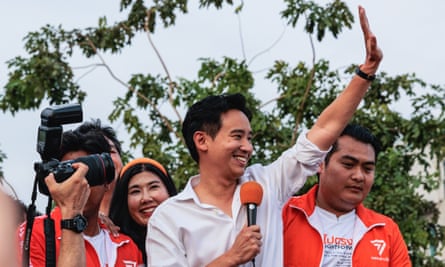The election in Thailand ended with an unexpected result: the triumph of progressive, anti-military party Move Forward. But due to Thailand’s electoral system, the party still faces a tricky path to claiming power. So, what happens next?
Who won Thailand’s election?
Move Forward – a young, progressive opposition party – stunned many observers by winning 14.2m votes, more than any other party, and sweeping all but one seat in Bangkok.
It had campaigned promising to remove the military’s influence from politics to make the country more democratic, break up the big monopolies that dominate the economy, expand the welfare system, modernise the school curriculum, scrap mandatory conscription, and – most sensitive of all – reform the strict lese majesty law that shields the king from criticism. The party is hugely popular among young people, and its success reflects changing societal values and attitudes towards power structures and key institutions.
Pheu Thai, a heavyweight opposition party associated with the ousted former prime minister Thaksin Shinawatra, came second. It had hoped for a landslide, and this is the first time in 20 years that it has not won the most seats in a general election.
The ruling former army chief Prayuth Chan-ocha, who first came to power in a coup, performed poorly.
Move Forward and Pheu Thai have said they will form a coalition along with other opposition parties, however they face major hurdles.

Why is it so difficult for the winning party to form a government?
Thailand’s future prime minister is voted on not just by the House of Representatives, whose 500 members were determined by Sunday’s election, but also by the unelected Senate. All 250 senators were appointed by the military after the last coup and they are generally seen as part of the conservative establishment that protects the political status quo.
Move Forward’s policy platform, especially its pledge to reform the lese majesty law, could be a major block that means many senators will not allow Move Forward’s leader Pita Limjaroenrat to become prime minister.
When will parliament vote on the next prime minister?
A joint session of the House of Representatives and the Senate will be held in July to select the new prime minister.
Move Forward has said that, with its planned coalition, it would have 309 seats in the House of Representatives. This is short of the 376 that is needed for Pita to become prime minister.
Pita said on Monday that he was not concerned about the Senate voting against him, and appeared to almost dare senators to defy the popular vote. “It is the consensus from the people, which every side should accept. Resisting the consensus will be of no benefit to anyone,” he said.

Are things over for Prayuth Chan-ocha?
The election delivered a damning verdict to Prayuth, and he said on Sunday night that he respected democracy and that he hoped Thailand “will be peaceful and prosper”. He still technically has enough seats to be in the running for prime minister, though it would be difficult for him to sustain a minority government.
But even if Prayuth’s political career is over, the conservative royalist military establishment that he represents remains incredibly powerful, and there are various mechanisms that can be used against its opponents. This includes not only the Senate but also the courts.
Move Forward’s predecessor, Future Forward, which also promised reform and performed well in the 2019 election, was dissolved just one year later. Shutting down political parties is a common trend in Thailand, a country that is prone to military coups. Since 2006, nine political parties have been dissolved – including not only Future Forward, but also predecessors of Pheu Thai.
A complaint has already been filed against Pita with the election commission, claiming that he owns undeclared shares in a media company. He has denied wrongdoing.
What has Move Forward’s leader Pita Limjaroenrat promised?
Pita said on Monday that he wanted to form a government as quickly as possible to avoid a power vacuum.
“The sentiment of the air has changed,” he said of his election success. “People have been through enough.”
He wanted Thailand to become “fully democratic” and decentralised, “with an economy that works for everybody not just the 1% on top”, and an ability to be flexible and adjust to new challenges – such as climate change or pandemics.
He also said he favoured “rules-based diplomacy”, and that it was not acceptable for bigger states to bully smaller countries. Thailand should stick together with mid-size countries, he said, and contribute to stability in the region. He said he wanted to push for progress in a regional five-point plan that was created, and has so far failed, to resolve the crisis in neighbouring Myanmar, which is engulfed in conflict between the military junta and pro-democracy opponents. He also said he wanted to created a humanitarian corridor between Thailand and Myanmar – which would be a stark shift in policy.


